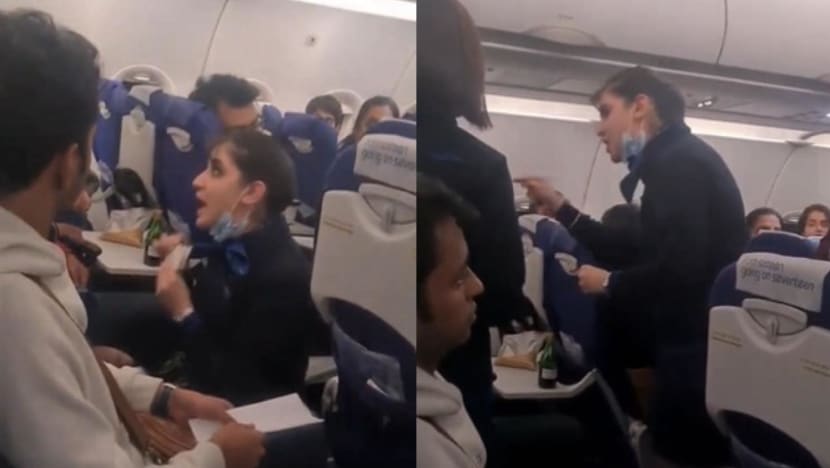Commentary: Why are more passengers misbehaving on airplane flights?
The plain truth is that you don’t need to be unruly to torment fellow passengers and cabin crew on flights, says Jemimah Wei.

Screengrabs of the argument between an IndiGo crew member and passenger. (Images: Twitter/@shukla_tarun)
SINGAPORE: The year of revenge travel has been attended by anger and even violence. As borders reopened in 2022, we’ve seen unruly passengers embarking on intoxicated soliloquy, harassing, intimidating and physically abusing fellow passengers and crew.
The International Air Transport Association defines unruly passenger incidents as “violence against crew and other passengers, harassment, verbal abuse, smoking, failure to follow safety and public health instructions”, a range of behaviour showcased in the viral videos that have lit up headlines and phone screens.
Some flight attendants, already at breaking point, have fought back. In a clip posted on Twitter in December 2022, an IndiGo crew member was seen chastising a passenger for shouting at her colleague. “I’m an employee,” she retorted, after several attempts at de-escalation, “I’m not your servant.”
A HAMMOCK OF INTIMATE ANXIETY
To travel by air is to exist in a hammock of intimate anxiety. You’re crammed up against strangers similarly engaged in the social contract of proximate courtesy, an inherently stressful situation even before the pandemic.
And COVID-19 has exacerbated tensions even further. The US Federal Aviation Administration logged close to 6,000 unruly passenger incidents across US airlines in 2021, up from a yearly average of 100 to 150. More than 4,000 of those incidents were related to mask-wearing.
In 2022, Kris Major, chair of the European Transport Workers Federation’s Joint Aircrew Committee, labelled the summer’s travel chaos of cancelled flights and lost luggage as the worst aviation crisis he had seen in more than two decades, and that the shortage of flight attendants has made the job “completely unsustainable”.
Closer to home, reports of false bomb threats, cabin crew assault, and an absurd refusal to engage in the mandatory, legally enforceable practice of fastening one's seat belt proliferated local media late last year.

Yet in February 2022, CNBC reported that “air rage” and refusing to wear face masks was primarily a problem in Europe and America - not so much Asia. Global Twitter data reflected similar statistics - less than 2 per cent of conversations around unruly passenger behaviour originated from users in Asia, per Hootsuite.
And according to a Nov 28 statement by Singapore Transport Minister S Iswaran, citing an average of 1.4 incidents per 1,000 flights over the past five years, there’s been no significant increase in unruly passenger behaviour on board Singapore carriers.
PASSENGERS HAVE BECOME MORE DEMANDING
If we go by the aviation definition of “unruly”, pure statistical data paints an image of relative decency. While this picture isn’t inaccurate, it’s just not complete.
The plain truth is that you don’t have to be unruly to torment. Among the cabin crew I spoke to - who agreed to share their stories on the condition of anonymity - there was an overwhelming consensus that, while not unruly per se, passengers have become more demanding.
Some of this comes down to cost: With hefty increases in flight prices, expectations of service deserved have risen correspondingly. Some due to a lack of knowledge: Without understanding what the updated safety requirements are, passengers might assume that the full range of available onboard services has returned to pre-pandemic levels.
And some of it simply comes down to trying to get the most value out of one’s ticket. Following a viral TikTok hack revealing the types of free food and drink passengers were “entitled to” on economy flights, cabin crew noticed a spike in tailored requests at exactly the point where airlines are struggling to cope with the surge in passenger numbers.
None of this is explicitly malicious. But it does reflect a lack of consideration for the human on the other side of the interaction. Of course you can ding the service bell every 30 minutes to ask for consecutive bowls of instant chicken ramen. But should you?
A wave of tell-all YouTube videos has emerged, featuring ex-crew who’ve recently left the industry. They often cite mental health concerns triggered by the pandemic, but note that the stresses involved in bearing the brunt of passenger emotion have festered for years.
As one flight attendant pointed out, passengers have always been demanding but the strain is now particularly bad.
BAD BEHAVIOUR NOT CONFINED TO THE RUNWAY
We would be remiss to silo the issue purely to the runway. Airplanes have always been a timed microcosm of society, cruising above ground. They might pressurise existing tensions - scientific studies have linked inflight low air pressure to the incapacity to regulate emotion - but one does not magically transform into a gnome the minute they step on board.
During the pandemic, reports of bad behaviour abounded on land too, from road rage to unconscionable abuse of frontliners and service staff. In explaining where this acting out comes from, experts have pointed to the extraordinary times of COVID-19, with its many rules and restrictions sapping our self-restraint, and its uncertainty triggering fear and anxiety, manifesting as aggression in some individuals.
Such soul-searching has been undertaken by conglomerates as well. When Amazon senior engineer Tim Bray resigned in May 2020, in protest of the company firing warehouse workers who complained about insufficient protection against COVID-19, companies such as Pepsi and Ford launched PR campaigns to celebrate essential workers.
But this sparks scrutiny over whether corporate labour practices really live up to feel-good messaging. Likewise, clapping for healthcare workers, while initially born of well-intentioned enthusiasm, ultimately failed to address systemic issues such as rising patient abuse and burnout when not backed by institutional change.
In short, it’s not just interpersonal relations that bear examination as we move through a pandemic-ravaged world. It’s everything and everyone.
MOVING FORWARD
Now that we’re emerging from isolation, returning to the world both on land and in the air, the age-old question of what we owe to each other has resurfaced more urgently than ever.
As we prepare ourselves for travel in a post-pandemic era, how might we reconceive our roles as passengers and customers? One might not be unruly but that doesn’t make them humane. Gradations exist between both poles, and where we individually land on this scale is a choice we all must make.
Jemimah Wei is a writer and host based in Singapore and the San Francisco Bay Area, where she is a Stegner Fellow at Stanford University.


















